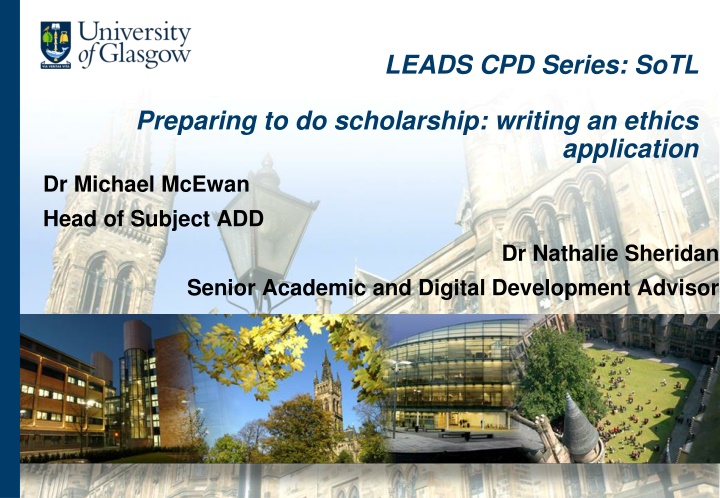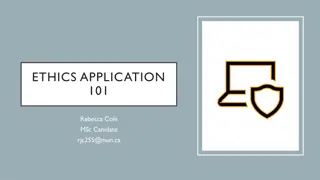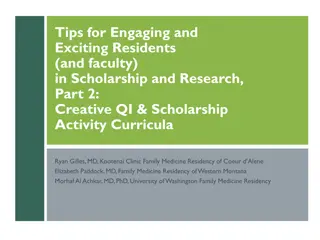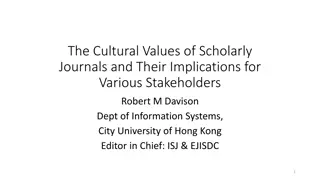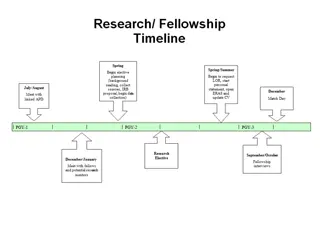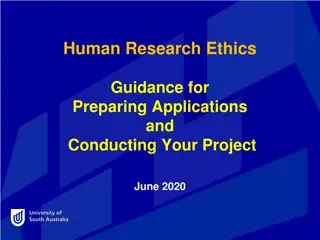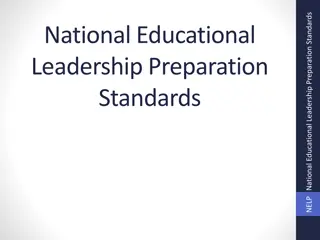Ethics Application: Scholarly Preparation & Considerations in Educational Research
Explore the importance of scholarly preparation for writing an ethics application in educational research, incorporating adequate preparation, ethical considerations in SoTL, BERA guidelines, and ethical considerations such as risk, consent, and confidentiality.
Download Presentation

Please find below an Image/Link to download the presentation.
The content on the website is provided AS IS for your information and personal use only. It may not be sold, licensed, or shared on other websites without obtaining consent from the author.If you encounter any issues during the download, it is possible that the publisher has removed the file from their server.
You are allowed to download the files provided on this website for personal or commercial use, subject to the condition that they are used lawfully. All files are the property of their respective owners.
The content on the website is provided AS IS for your information and personal use only. It may not be sold, licensed, or shared on other websites without obtaining consent from the author.
E N D
Presentation Transcript
LEADS CPD Series: SoTL Preparing to do scholarship: writing an ethics application Dr Michael McEwan Head of Subject ADD Dr Nathalie Sheridan Senior Academic and Digital Development Advisor
Outline The importance of preparation The ethics of educational research and SoTL enquiries; Ethics in your subject area. 1
Adequate Preparation Glassick s Framework for evaluating scholarship presents several stages 1. Clear Goals 2. Adequate Preparation 3. Appropriate Methods 4. Significant Results 5. Reflective Critique 6. Effective Presentation Adequate preparation refers to knowing the field . Have you read the literature, do you know the appropriate methods to collect data, are you building on the work of others? 2
The ethics of SoTL A teacher s enquiry into their practice is a legitimate academic practice and therefore normally exempt from a requirement to get ethical approval. But, if such enquiries are to be made public, then ethical approval is required. Cleaver, E., Lintern, M., McLinden, M., & Askews & Holts Library Services. (2014). Teaching and learning in higher education: Disciplinary approaches to educational enquiry. London: SAGE Publications Ltd, pp. 54 71. 3
BERA and ethics In principle, research, scholarship and professional enquiry are all governed by the same standards of ethical practice. If you think of ethics as ticking a box then you are missing the point Ethics and research design are not mutually exclusive. They impact on each other, and must be considered simultaneously British Educational Research Association (BERA) (2018) Ethical guidelines for educational research. Available at: https://www.bera.ac.uk/researchers-resources/publications/ethical-guidelines-for-educational-research-2018 (Accessed: 2nd August 2018). 4
Ethical considerations Issues of risk Openness/disclosure Voluntary informed consent Right to withdraw Children/vulnerable others Incentives Privacy/confidentiality/an onymity Dependent relationships 5
Ethical considerations Issues of risk Openness/disclosure Voluntary informed consent Why me? What s the point and what do I have to do? Right to withdraw Minimising harm and maximising benefit Withdrawal at any time, for any reason Avoid deception unless required Children/vulnerable others Incentives Privacy/confidentiality/an onymity Dependent relationships Confidentiality and anonymity is the norm, but not always possible Is participation influenced in any way? Commensurate and with good sense Implications in gaining consent 6
Common issues Issues of risk Openness/disclosure Voluntary informed consent Sufficient information including risks and benefits Right to withdraw Unnecessary/ uneven risks for participants Explicit, with details of process (contact details) Lack of details regarding potential involvement Children/vulnerable others Incentives Privacy/confidentiality/an onymity Dependent relationships Confidentiality and anonymity but what if you have concerns? Is participation influenced in any way? Implicit coercion; inappropriate incentives Not explicitly considered 7 7
Ethics at Glasgow College of Arts? 8
Ethics Examples What is the relationship between the amount of time level 1 History students in my tutorial group report that they spend on tutorial preparation and the number and quality of comments they make in a tutorial? An exploration of level 3 Pharmacology students perceived engagement in response to a lecture with problem solving activities in comparison to lectures without such activities 9
The Process (and the forms) 1: Applicant details Who is making the application? 2: Ethical risks 3: Researchers with access to the data 4: External funding details What could go wrong? Who will have access to the data (including transcription company)? Who funded the research? (Why is this important?) When will the study take place? (implications for how long the data should be retained) 5: Project detailed (start & end dates) 6: Justification for the research Why do this research at all? 10
The Process (and the form) 7: Research methodology and data collection Methods of data collection, why you chose these methods, time commitment for participants, how data will be analysed 8: Confidentiality & data handling How will you protect the privacy of your participants? What degree of anonymity will you offer? How/where will your store the data? Who has access? Plans for retention and disposal of *personal* data? (relates to GDPR) 9: Dissemination of results How will you report findings to participants, peers/colleagues? Will you store anonymised datasets for future research? 10: Recruitment of participants How/who will you recruit? How many? What incentives? In a dependent relationship (e.g. teacher/student)? 11: Permission to access participants If UofG staff/students, Head of School (if in one school), or Dean of Graduate Studies (if >1 school) or Clerk of Senate (if >1 college) 12: Informed consent Have you included PLS/information sheet? 11
The Process (and the form) 13: Monitoring How will you ensure the research is progressing as planned? 14: Health and safety Risks for you, the participants or other researchers? 15: Risk Lone working? Minimising distress to participants, sensitive topics or vulnerable groups? 16: Insurance Needed for e.g. work overseas, participants > 5000 17: Protection of Vulnerable Groups (PVG) Children and protected adults (note students under 18 constitute a PVG group) 18: UK and Scottish Government Legislation GDPR (2018) 19: Declarations by researchers (and supervisors) Acceptance of code of conduct for research and responsibility for managing project risks 12
Useful References Cleaver, E., Lintern, M., McLinden, M., & Askews & Holts Library Services. (2014). Teaching and learning in higher education: Disciplinary approaches to educational enquiry. London: SAGE Publications Ltd. Cohen, L. M., & Manion, L. (1979). L. & Morrison, K.(2011) Research methods in education. UK: Routledge. Glassick, C. E., Huber, M. T., & Maeroff, G. I. (1997). Scholarship Assessed: Evaluation of the Professoriate. Special Report. Jossey Bass Inc., Publishers, 989 Market Street, San Francisco, CA 94103. College ethics guidance: Arts: www.gla.ac.uk/colleges/arts/research/ethics/ CoSE: www.gla.ac.uk/colleges/scienceengineering/staff/committees/ethicscommittee/ CoSS: www.gla.ac.uk/colleges/socialsciences/students/ethics/forms/ MVLS: www.gla.ac.uk/colleges/mvls/informationforstaff/researchadministration/collegeethicscommittee/ If in any doubt, contact college ethics officers with your questions. 13
